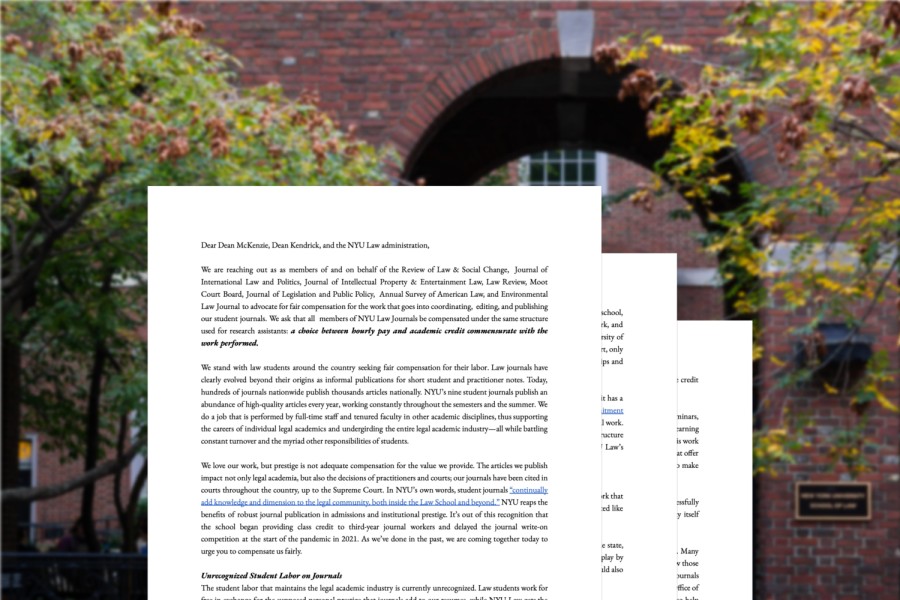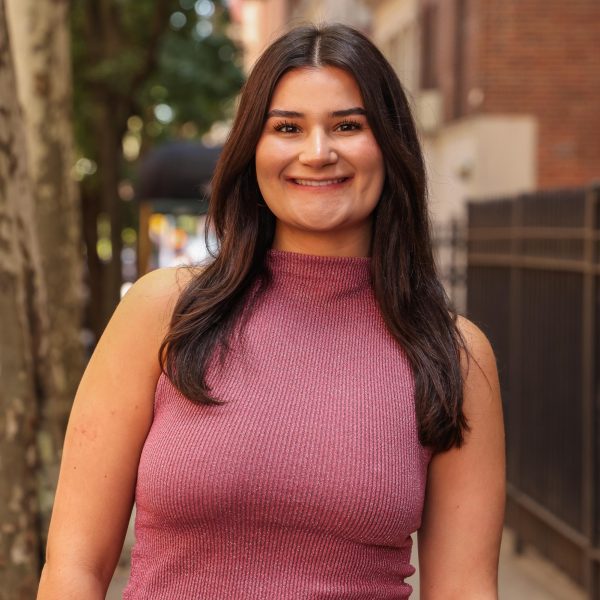NYU Law students demand compensation for academic journal work
Students at NYU Law are calling for administrators to allow all students to receive credit hours or hourly wages for their work on law journals.
(Illustration by Kevin Wu)
March 10, 2023
Students at NYU’s School of Law are demanding compensation for their work on student-run journals — scholarly publications affiliated with the law school that focus on legal issues. The students created a petition with over 250 signatures in support of the cause, and eight on-campus publications signed a letter to law school administrators this past Monday.
In the letter, students asked that all contributors to the journals be able to choose whether to receive compensation in hourly wages or credit hours. Currently, only third-year students are eligible for compensation through credit hours, and no students receive hourly pay.
“We love our work, but prestige is not adequate compensation for the value we provide,” the letter reads. “Our journals have been cited in courts throughout the country, up to the Supreme Court. NYU reaps the benefits of robust journal publication in admissions and institutional prestige.”
Sean Connolly, a second-year law student and an editor for one of the journals, and Devin McCowan, a third-year who edits a different journal, said that NYU Law administration has acknowledged the letter, but has yet to address student compensation.
Connolly also claimed that other universities, like the University of Pennsylvania and Vanderbilt University, give credit hours for all student work on journals. He said that if students are able to secure hourly wages, NYU Law would be the first law school to provide financial compensation for this type of work.
“There’s this expectation, not just at NYU, that you’re coming to this law school and doing a bunch of work just essentially for prestige and for grounding your future career,” Connolly said. “That’s kind of the logic we’re trying to change, this idea that all the work you’re doing in law school is stressful, uncompensated and you should just like go to law school, get a bunch of debt, do a bunch of work, and then ‘it’s fine, because you’ll get a job later.’”
Emily Rosenthal, a spokesperson for the law school, said that administration is in plans to discuss the petition with students in the future, but had no further information about the petition or how administrators will address it.
McCowan said that receiving hourly compensation is especially important for low-income students like himself.
“By having the ability to choose compensation, that could allow me to feel much less stressed about going out to eat with friends on the weekends or being able to just afford basic living expenses and things,” McCowan said. “It can mean a lot for me and make me feel more comfortable being at university like this, especially when I know a lot of my richer colleagues and students don’t have to necessarily worry in the same way about their living expenses.”
In the letter sent to administrators, students claimed that the American Bar Association requires law students to participate in 42.5 hours of work to receive an academic credit, and that if students were granted compensation in the form of credit hours for law journal work, it would be within ABA standards.
McCowan added that he is pleased to have received over 250 signatures on the petition and is grateful for the support of his colleagues.
“Having all these journals sign on and all these hundreds of people sign on to this petition is really inspiring and shows that if you need to find solidarity, that looking toward your peers can be the way in which you can find strength in numbers,” McCowan said. “Find people who really care about making sure that human beings are treated well.”
Correction, March 20: A previous version of this article incorrectly stated that the ABA required law students to engage in work before graduation. The article has been updated to reflect this correction. WSN regrets the error.
Contact Bruna Horvath at [email protected].

























































































































































